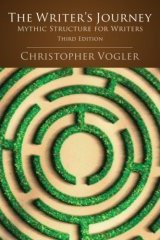The Writer's Journey: Mythic Structure For Writers is a popular writing textbook by writer Christopher Vogler, focusing on the theory that most stories can be boiled down to a series of narrative structures and character archetypes, described through mythological allegory.[1]
 | |
| Author | Christopher Vogler |
|---|---|
| Language | English |
| Genre | Non-fiction |
| Publisher | Michael Wiese Productions |
Publication date | 2007 |
| Publication place | United States |
| Media type | Paperback |
| Pages | 407 |
| ISBN | 978-1-932907-36-0 |
| OCLC | 154677482 |
| 808.2/3 22 | |
| LC Class | PN1996 .V64 2007 |
The book was very well received upon its release, and is often featured in recommended reading lists for student screenwriters.[2][3][4]
History
editThe book stems from a seven-page studio memo, "A Practical Guide to The Hero with a Thousand Faces".[5]
An earlier edition, The Writer's Journey: Mythic Structure for Storytellers and Screenwriters, was published in 1992. Vogler revised the book for the second release in 1998 and changed the title to The Writer's Journey: Mythic Structure for Writers. The third edition, published in 2007, included a new introduction, new artwork, and analysis of recent, popular motion pictures. In July 2020, the 25th Anniversary Edition was published, which includes new sections and topics.[6]
Summary of content
editThe archetypes
editThe first part of the book describes eight major character archetypes in detail.[7] Those are:
- Hero: someone who is willing to sacrifice his own needs on behalf of others
- Mentor: all the characters who teach and protect heroes and give them gifts
- Threshold Guardian: a menacing face to the hero, but if understood, they can be overcome
- Herald: a force that brings a new challenge to the hero
- Shapeshifter: characters who change constantly from the hero's point of view
- Shadow: character who represents the energy of the dark side
- Ally: someone who travels with the hero through the journey, serving variety of functions
- Trickster: embodies the energies of mischief and desire for change
Stages of the Journey
editThe second part describes the twelve stages of the Hero's Journey.[7] The stages are:
- The Ordinary World: the hero is seen in their everyday life
- The Call to Adventure: the initiating incident of the story
- Refusal of the Call: the hero experiences some hesitation to answer the call
- Meeting with the Mentor: the hero gains the supplies, knowledge, and confidence needed to commence the adventure
- Crossing the First Threshold: the hero commits wholeheartedly to the adventure
- Tests, Allies, and Enemies: the hero explores the special world, faces trial, and makes friends and enemies
- Approach to the Innermost Cave: the hero nears the center of the story and the special world
- The Ordeal: the hero faces the greatest challenge yet and experiences death and rebirth
- Reward: the hero experiences the consequences of surviving death
- The Road Back: the hero returns to the ordinary world or continues to an ultimate destination
- The Resurrection: the hero experiences a final moment of death and rebirth so they are pure when they reenter the ordinary world
- Return with the Elixir: the hero returns with something to improve the ordinary world
See also
edit- Dan Harmon, eight-step Story Circle
- John Yorke, author of Into The Woods: A Five-Act Journey Into Story, another book about the parallels between myths and screenwriting
- Three-act structure
References
edit- ^ "Christopher Vogler's screenwriting workshop". BBC Writers Room. Archived from the original on August 18, 2007. Retrieved 2007-08-18.
- ^ "Recommended Reading". Exposure.co.uk. Retrieved 2007-08-06.
- ^ "Recommended Reading". Demontfort University Official Website (Humanities). Retrieved 2007-08-06.
- ^ "Books about Writing". OgleMoore staff. Retrieved 2007-08-06.
- ^ Vogler, Christopher. "A Practical Guide to The Hero with a Thousand Faces". An online copy of the memo.
- ^ "The Writer's Journey – 25th Anniversary Edition: Mythic Structure for Writers". MWP.com. Retrieved 2020-06-04.
- ^ a b The Writer's Journey: Mythic Structure for Writers, Third Edition, Vogler, Christopher, 2007.